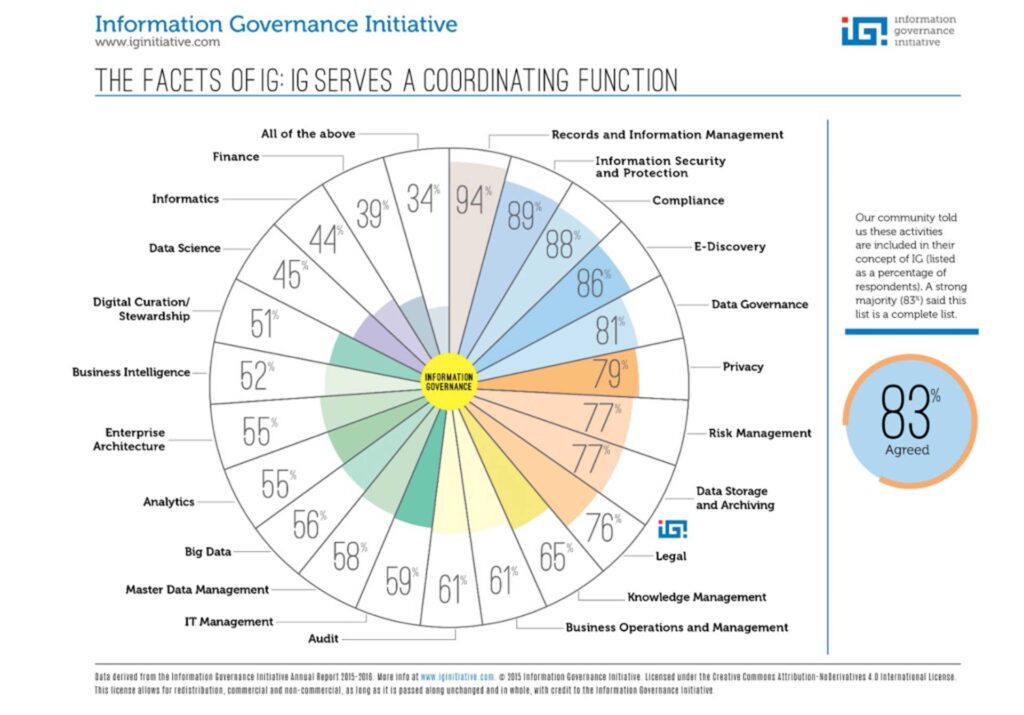Defining IG for Law Firms
Information governance means different things to different people. When leading industry organization IGI (Information Governance Initiative) asked its community members to help it define the term, a wide range of activities fall under the IG umbrella respondents agreed that there are a wide range of activities that fall under the umbrella of IG.

In the chart, activities are ranked according to how closely they are linked to the concept of information governance. All the big activities are covered, including business intelligence and big data. Notably, out of all the activities “Records & Information Management” and “Compliance” are ranked at the top of the list. In fact, 94% of respondents said that records and information management were the most important components of IG.
Records and information management is a common pain point for most law firms. It’s a highly labor-intensive and costly aspect of their business, worsening yearly with the rise of electronic and physical data storage costs. Recently, pressure to meet compliance goals has increased significantly. More than ever, law firms are struggling to solve the information governance problem.
Information Governance Challenges for Law Firms
While there are numerous challenges that are unique to law firms’ internal setups, there are a few challenges that most share. What follows are the big issues we’ve been hearing about over the past few years.
1. Where are information governance policies being stored?
Regarding technology, the legal industry is not the most innovative sector. As a result, it’s not uncommon for policies to be found in a spreadsheet, in an email, on a file share, or in a document management system. Lacking easy access, firms face numerous challenges when managing information governance policies and making them actionable.
2. Are Outside Counsel Guidelines being followed?
This challenge relates back to where Outside Council Guidelines (OCG) are being stored. If staff can’t find OCG, applying policies on an ongoing basis is difficult to monitor and control. Most firms lack a streamlined process for tracking and managing OCG during new business intake. This makes following OCG policies practically impossible once the matter gets going.
3. What’s our compliance track record?
Oftentimes staff are aware that the firm has an information governance policy. However, they are unable to identify how closely and consistently the policy is being followed. A firm might be doing a stellar job with electronic items. However, compliance for physical records may have fallen by the wayside. Many firms lack an effective method of monitoring compliance across all repositories. And they are overwhelmed by the idea of trying to catch up with the backlog.
4. Can we measure our progress toward compliance?
This issue relates to the backlog of physical and electronic records. As firms implement changes with information governance, it’s important to see progress toward 100% compliance. The issue is that most firms can’t measure how compliant they are. Is the firm 40% compliant? Is it 80% compliant? It’s common for firms to have 10,000 boxes of records destroyed –which means excess storage fees and needless risk.
5. How audit-proof is the firm?
Without efficient information governance processes, firms function under the threat of a future audit. Regulated industries – like energy, financial services, government agencies, and pharmaceuticals – cooperatives to create detailed industry-specific OCG. In recent years, these cooperatives have been contracting with auditors to assess compliance, which has increasingly extended to law firms. However, most law firms cannot respond to client audits quickly and produce the necessary audit trials.
6. Is disposition defensible?
Everything comes down to making sure a firm’s records disposition is defensible. This is a major concern for most firms today. Without a simplified system for managing and tracking information governance, firms lack an easily accessible history of retention and disposition. As a result, in the event of an audit, it’s almost impossible to quickly produce an audit trail.
Automate Information Governance with FileTrail
If your firm has gone to the expense of developing comprehensive IG policies around content lifecycle management, how do you make sure that they’re implemented consistently? The answer lies in automation. Automating information governance ensures firms can execute against their policies and guidelines, significantly lowering overhead costs for physical and digital data.
- FileTrail has been developing records management solutions for highly regulated industries with sensitive data for more than 20 years. FileTrail product suite is customizable and integrates with major document management systems, file shares, and other business platforms. Using our matter mobility tool can even help you migrate data between systems.
- Automatically apply retention policies to Matters and documents across multiple physical and electronic repositories.
- Apply Outside Counsel Guidelines to specific Matters or Clients.
- Measure staff progress toward review and disposition.
- Generate reports that forecast dispositions over the next 5-10 years to reveal the hard-dollar value of retention and future savings.
- Streamline response to client audits with on-demand audit reporting.





